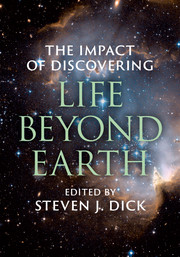Book contents
- Frontmatter
- Dedication
- Contents
- List of contributors
- Introduction: Astrobiology and society
- Part I Motivations and approaches: How do we frame the problems of discovery and impact?
- Part II Transcending anthropocentrism: How do we move beyond our own preconceptions of life, intelligence, and culture?
- Part III Philosophical, theological, and moral impact: How do we comprehend the cultural challenges raised by discovery?
- Part IV Practical considerations: how should society prepare for discovery – and non-discovery?
- 16 Is there anything new about astrobiology and society?
- 17 Preparing for the discovery of extraterrestrial life: are we ready?: Considering potential risks, impacts, and plans
- 18 Searching for extraterrestrial intelligence: preparing for an expected paradigm break
- 19 SETI in non-Western perspective
- 20 The allure of alien life: Public and media framings of extraterrestrial life
- 21 Internalizing null extraterrestrial “signals”: An astrobiological app for a technological society
- Contributor biographies
- Index
- References
19 - SETI in non-Western perspective
from Part IV - Practical considerations: how should society prepare for discovery – and non-discovery?
Published online by Cambridge University Press: 05 November 2015
- Frontmatter
- Dedication
- Contents
- List of contributors
- Introduction: Astrobiology and society
- Part I Motivations and approaches: How do we frame the problems of discovery and impact?
- Part II Transcending anthropocentrism: How do we move beyond our own preconceptions of life, intelligence, and culture?
- Part III Philosophical, theological, and moral impact: How do we comprehend the cultural challenges raised by discovery?
- Part IV Practical considerations: how should society prepare for discovery – and non-discovery?
- 16 Is there anything new about astrobiology and society?
- 17 Preparing for the discovery of extraterrestrial life: are we ready?: Considering potential risks, impacts, and plans
- 18 Searching for extraterrestrial intelligence: preparing for an expected paradigm break
- 19 SETI in non-Western perspective
- 20 The allure of alien life: Public and media framings of extraterrestrial life
- 21 Internalizing null extraterrestrial “signals”: An astrobiological app for a technological society
- Contributor biographies
- Index
- References
Summary
One of the more significant weaknesses in the search for extraterrestrial intelligence (SETI) research has been the limited contribution from scholars working outside of the Western cultural context including North America and Europe. While there has been interest among astronomers in countries like Japan and South Korea in the search, involvement has been limited particularly when it comes to more speculative research and writing about communication with extraterrestrial intelligence and the possible nature of civilizations inhabiting exoplanets. As argued in Chapter 8 of this volume, there is an ethnocentric bias in much writing about extraterrestrial life that is shaped by both the Western intellectual and religious traditions of Social Darwinism and Christianity, and this ethnocentrism significantly shapes the ways we think about what constitutes a civilization and how cultures and civilizations evolve over time.
In this chapter, we are interested in giving some thought to the potential influence contributions from a non-Western perspective might make in expanding our thinking about extraterrestrial intelligence. This has both pragmatic and theoretical consequences. From a theoretical perspective, alternative worldviews (from the Christian perspective) – such as what we see in Buddhism or Taoism – have the potential to shape our thinking about the nature of progress and change. Pragmatically, this should widen our scope of imagination as we contemplate the possibilities and difficulties we may encounter should contact occur.
Before moving on, we want to emphasize that this chapter is quite speculative. Our perspective here is intended only as an example of how a non-Western perspective might influence our thinking about SETI. In many respects, this chapter is a call for SETI scholars to work on finding new ways to draw non-Western scholars into the discourse. It was interesting that during the Library of Congress symposium that formed the basis for this volume, there were participants from the Vatican and those who worked in areas of Western theology and ethics, but there were no thinkers involved who work from a Buddhist, Muslim, or Hindu perspective (just to name a few possibilities). Indeed, as McAdamis (2011: 339) has argued, “[w]hether a result of ethnocentrism, or of the global influence of Western philosophy, most research engaging astrobiology's relationship with religion has tended to disproportionately focus on Christian theology.”
- Type
- Chapter
- Information
- The Impact of Discovering Life beyond Earth , pp. 299 - 307Publisher: Cambridge University PressPrint publication year: 2015
References
- 5
- Cited by

